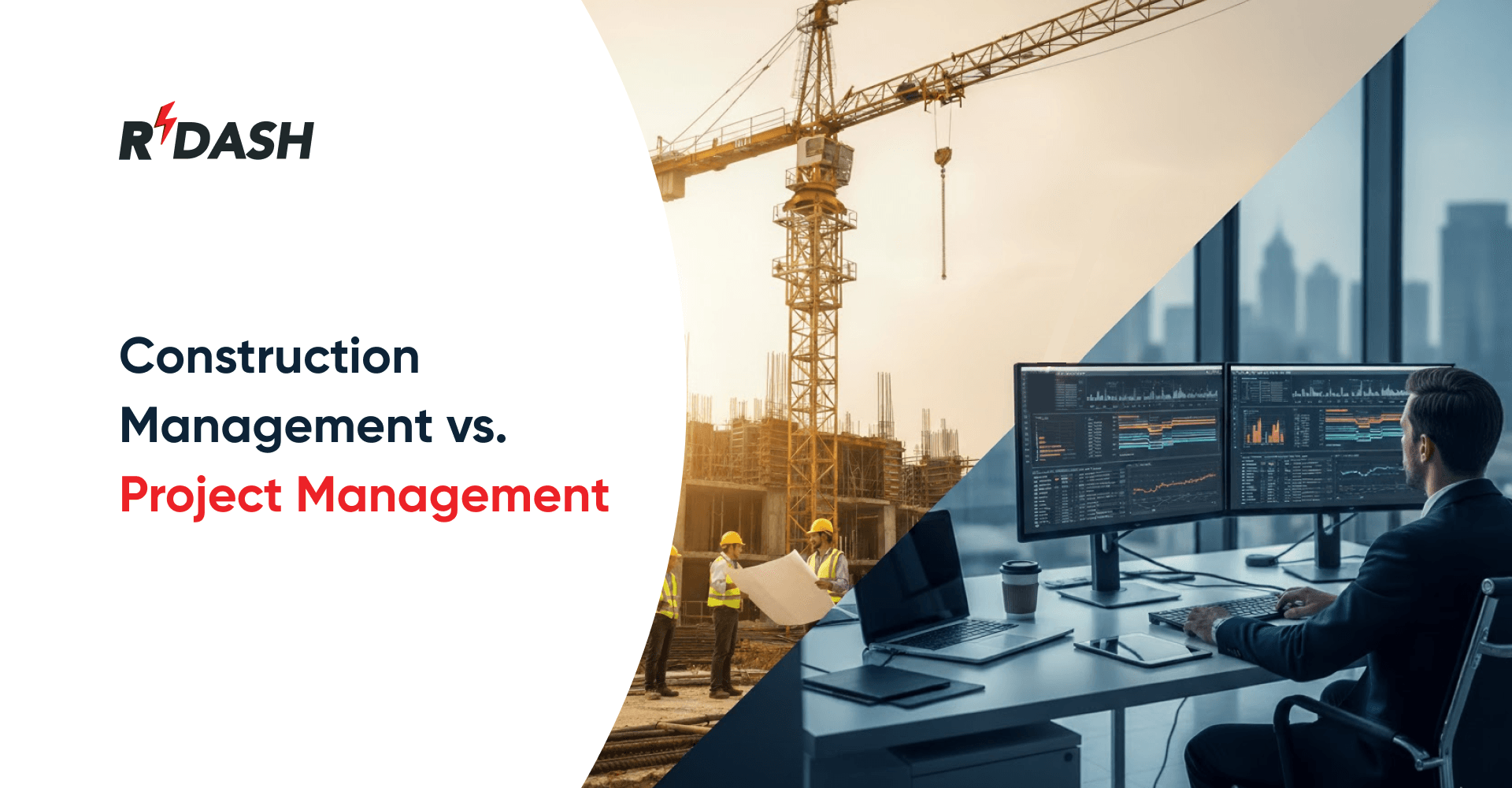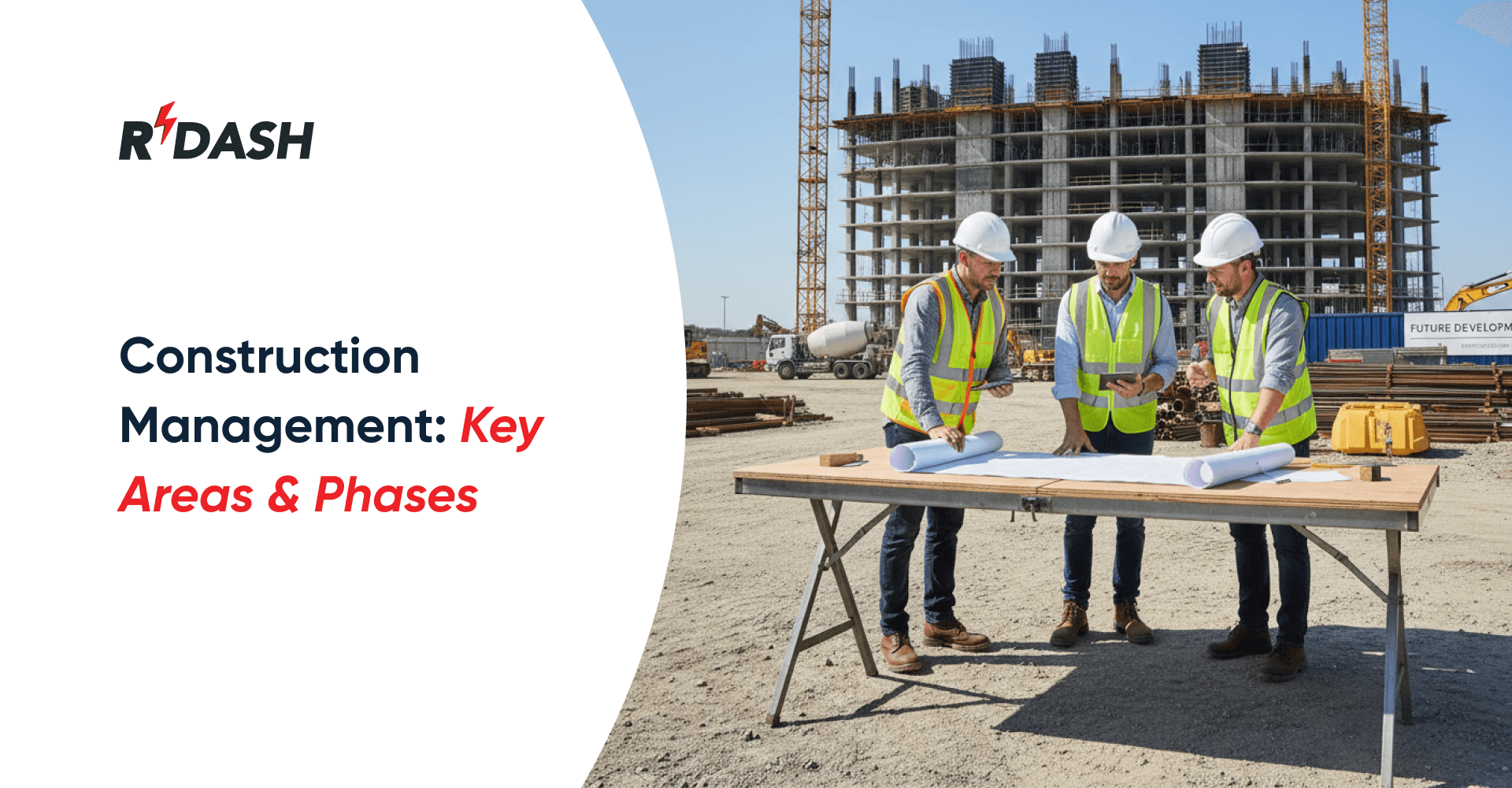What Is Construction Management?
Construction management is the process of planning, coordinating, and supervising construction activities from start to finish. It focuses mainly on the construction phase of a project and ensures that the work is done on time, within budget, and according to design and safety standards.
A construction manager usually works on-site and handles day-to-day activities. They manage materials, labor, contractors, safety checks, and quality control. Their job is to make sure everything at the construction site runs smoothly. They also deal with unexpected issues, such as delays, material shortages, or weather-related challenges.
Construction management is important because it helps avoid costly errors, improves team coordination, and ensures that the final structure meets all required standards.
What Is Project Management?
Project management is a broader role that covers the entire project lifecycle – from initial planning to final delivery. In construction, this includes early tasks like creating the project scope, setting timelines, managing budgets, hiring vendors, and overseeing design approval, in addition to monitoring the actual build.
A project manager doesn’t only focus on construction. They also handle contracts, client communication, stakeholder updates, and overall coordination between different departments such as design, procurement, finance, and construction.
The project manager acts as the main point of contact between the client and the team. Their goal is to make sure the project meets the client’s expectations in terms of time, cost, and quality.
Difference Between Construction Management vs. Project Management
While both roles are important in the construction industry, construction management and project management have different responsibilities and areas of focus.
| Aspect | Construction Management | Project Management |
|---|---|---|
| Main Focus | Day-to-day construction activities on site | Entire project lifecycle from planning to completion |
| Scope of Work | Manages labor, materials, equipment, and site work | Oversees design, budgeting, scheduling, and execution |
| Work Location | Mostly on the construction site | Works both on-site and off-site |
| Team Supervision | Supervises subcontractors, site engineers, and laborers | Manages all teams including design, finance, and construction |
| Reporting | Reports to the project manager | Reports to the client or top-level stakeholders |
| Goal | Deliver safe, on-time, and quality construction | Deliver the full project on time and within budget |
While the construction manager ensures that the building is being constructed correctly, the project manager ensures that the entire project is moving forward as planned.
Skills and Requirements of a Construction Manager and Project Manager
Construction Manager
To be effective, a construction manager needs strong site-level expertise and coordination skills. Key skills and requirements include:
- Technical Knowledge: Understanding construction methods, materials, safety codes, and quality standards.
- On-Site Leadership: Ability to manage laborers, subcontractors, and engineers at the site.
- Time Management: Scheduling daily tasks and ensuring work progresses as planned.
- Problem Solving: Quickly resolving on-site issues like delays, weather problems, or material shortages.
- Safety Awareness: Enforcing safety protocols and maintaining a hazard-free work environment.
- Experience: A background in civil engineering, construction, or site supervision is commonly required.
Project Manager
A project manager works at a higher level, managing the entire project from idea to completion. Important skills and qualifications include:
- Planning and Organization: Creating project timelines, budgets, and resource plans.
- Communication Skills: Coordinating with clients, vendors, contractors, and internal teams.
- Financial Management: Monitoring project budgets and controlling costs.
- Risk Management: Identifying possible delays or cost overruns and creating backup plans.
- Leadership: Managing cross-functional teams and making high-level decisions.
- Qualifications: Often holds a degree in project management, construction management, architecture, or business, with certifications like PMP (Project Management Professional) being a plus.
Choosing Between Construction Management vs. Project Management
Choosing between construction management and project management depends on your career goals and interests.
If you enjoy being on-site, solving technical problems, and managing the actual building work, construction management might be the right fit. This role involves working closely with site teams, ensuring safety, and solving on-the-ground challenges.
If you prefer a broader role that involves planning, budgeting, communication with clients, and managing multiple teams and phases, then project management could be a better choice. This role gives you more control over the entire project from start to finish.
In many successful projects, both roles work together closely. The project manager sets the direction, and the construction manager brings the vision to life on-site. Understanding the difference helps in choosing the right role or building the right team for any construction project.
How RDash can help
RDash is a construction project management software that streamlines planning, site execution, and progress tracking through a centralized platform. Whether you’re managing on-site activities or coordinating across departments, RDash keeps teams aligned, reduces delays, and improves cost control from start to finish.
FAQs
1. What is the main difference between a construction manager and a project manager?
A construction manager focuses on managing the physical building process, while a project manager oversees the entire project, including planning, design, finances, and coordination.
2. Can one person handle both roles?
Yes, on small projects, one person might manage both roles. But on larger projects, these are usually separate roles due to the workload and complexity.
3. Who earns more – a construction manager or a project manager?
Salaries vary by location and experience, but project managers often earn more due to their broader responsibilities and involvement across all project phases.
4. Which role is more site-focused?
The construction manager is more involved with daily site activities, whereas the project manager may divide their time between the site and office.
5. What industries need construction and project managers?
These roles are needed in residential, commercial, industrial, and infrastructure projects – such as buildings, roads, bridges, and interior fit-outs.
6. Do both roles require the same qualifications?
Not always. A construction manager typically has a technical or engineering background, while a project manager may come from construction, business, or planning backgrounds.
7. How do construction and project managers work together?
The project manager sets overall goals, manages resources, and communicates with stakeholders. The construction manager ensures that the actual building work is completed according to the plan and within the set timeframe.






